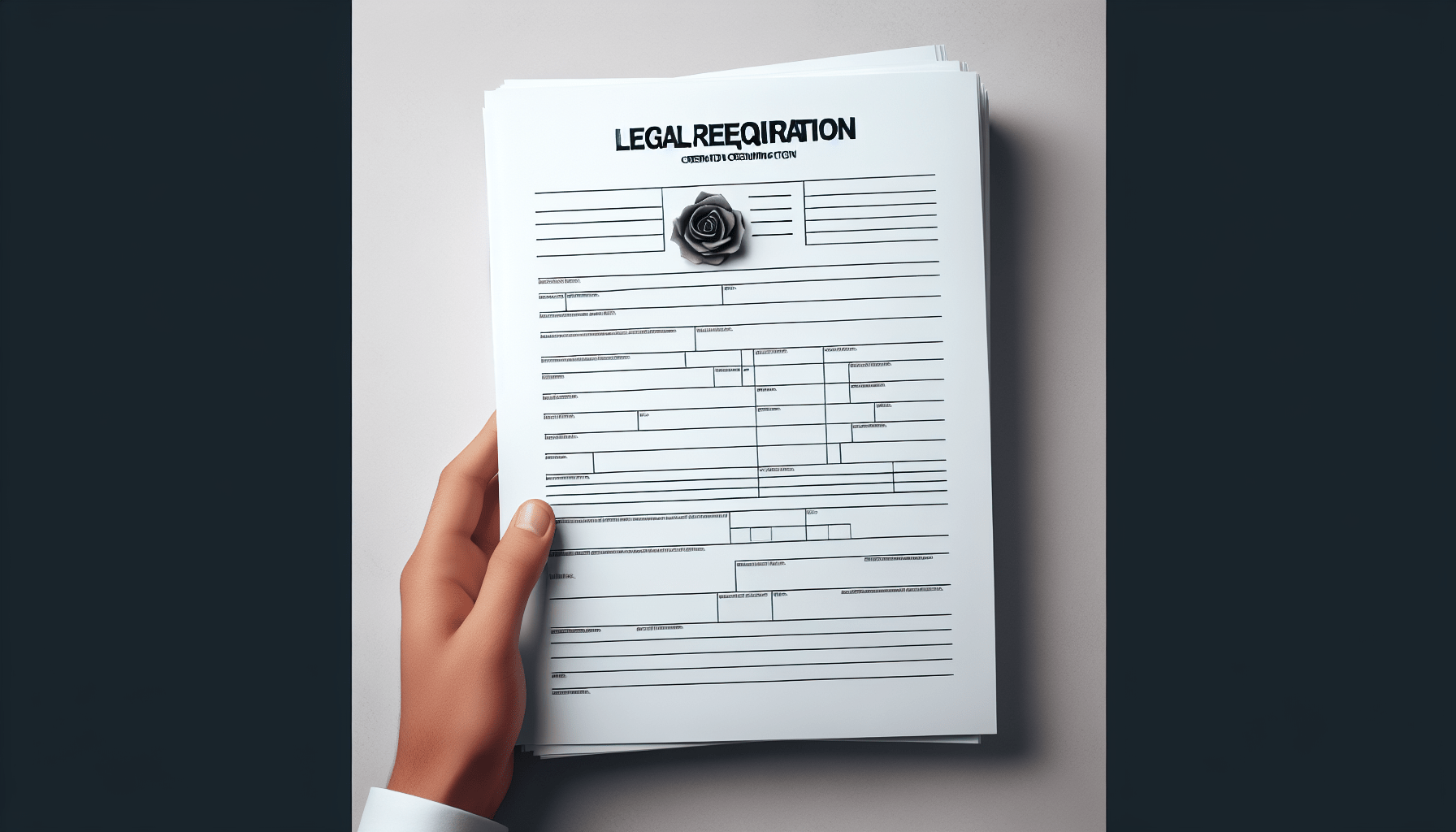If you’re considering cremation as a final resting option in Atlanta, it’s essential to understand the legal requirements surrounding this process. From obtaining the necessary permits to adhering to specific guidelines, this article will provide you with a comprehensive overview of what you need to know before proceeding with a cremation in Atlanta. Whether you’re planning for yourself or navigating the wishes of a loved one, this information will help ensure a smooth and legal process, allowing you to focus on honoring and remembering your loved one in the most meaningful way possible.
1. Obtaining a Death Certificate
1.1. Required Information
When it comes to obtaining a death certificate in Atlanta, there are a few key pieces of information that you will need to provide. These include the full name of the deceased, their date and place of birth, their social security number, and their current address at the time of death. It is also important to have information on the deceased’s parents, including their full names and birthplaces, as well as the deceased’s marital status and occupation at the time of death.
1.2. How to Obtain a Death Certificate
To obtain a death certificate in Atlanta, you will need to contact the vital records office in the county where the death occurred. You can typically obtain the certificate in person, by mail, or online through the official website of the vital records office. It is important to note that there may be a fee associated with obtaining a death certificate, and the required forms and documentation may vary depending on the county.
1.3. Timeframe for Obtaining a Death Certificate
The timeframe for obtaining a death certificate in Atlanta can vary depending on various factors, such as the county where the death occurred and the method of application. In general, it is advisable to apply for the death certificate as soon as possible to avoid any delays. Typically, the processing time can range from a few days to a few weeks. It is recommended to contact the vital records office in the respective county for more specific information on the expected timeframe.
2. Consent for Cremation
2.1. Obtaining Consent
Consent for cremation is an important requirement that must be fulfilled before the cremation process can take place. In Atlanta, consent can be obtained from the next of kin or the authorized representative of the deceased. It is crucial to obtain this consent in writing to ensure legal compliance.
2.2. Who Can Provide Consent
The person who can provide consent for cremation in Atlanta is typically the next of kin. This includes the spouse, adult children, parents, or siblings of the deceased. In the absence of any of these individuals, an authorized representative, such as a legal guardian or an individual who has power of attorney, can provide the necessary consent.
2.3. Documenting Consent
In order to document the consent for cremation, it is important to use the appropriate forms provided by the crematory or funeral home. These forms will typically require the signature of the person providing consent, as well as their relationship to the deceased. In some cases, additional documentation may be required, such as a copy of the legal documentation proving the authority of the authorized representative.
3. Registration of Death
3.1. Filing the Death Registration
After a death occurs, it is necessary to file the death registration with the appropriate authorities. In Atlanta, this can be done through the vital records office in the county where the death occurred. The death registration form will require information such as the deceased’s full name, date and place of birth, social security number, and the cause and manner of death. It is essential to ensure that all information provided is accurate and complete to avoid any potential issues.
3.2. Role of the Funeral Director
The funeral director plays a crucial role in the registration of death in Atlanta. They are responsible for assisting the family in completing the necessary paperwork and ensuring that all required information is provided accurately. The funeral director will work closely with the family to gather the required documents and submit them to the appropriate authorities.
3.3. Required Documents
In order to complete the registration of death in Atlanta, several documents will be required. These typically include the death certificate, the deceased’s social security number, and any additional documentation related to the cause of death, such as a medical examiner’s report. It is important to consult with the funeral director or the vital records office to ensure that all necessary documents are provided.
4. Transportation of the Deceased
4.1. Legal Transportation Requirements
Transporting the deceased from the place of death to the crematory requires compliance with certain legal transportation requirements. In Atlanta, these requirements may include obtaining a permit from the local authorities and adhering to the regulations set forth by the Georgia Board of Funeral Service. It is essential to consult with transportation service providers who are familiar with these requirements to ensure a smooth and lawful transfer.
4.2. Duties of Transportation Service Providers
Transportation service providers play a crucial role in ensuring the proper and respectful transportation of the deceased. They are responsible for safely transferring the body from the place of death to the designated crematory. Transportation service providers should possess the necessary knowledge and experience to handle the transportation process with care and professionalism.
4.3. Special Cases or Exceptions
In certain cases, there may be special circumstances or exceptions to consider when transporting the deceased in Atlanta. These may include situations where the death occurred outside of the state or in another country. In such cases, additional documentation and coordination with the appropriate authorities may be required. It is important to consult with the transportation service provider and the vital records office to ensure compliance with any special requirements.
5. Handling and Storage of the Body
5.1. Crematory Regulations
Crematories in Atlanta are subject to specific regulations regarding the handling and storage of the body. These regulations are in place to ensure the respectful and proper treatment of the deceased. Crematories must adhere to guidelines regarding the transportation and storage of the body prior to the cremation process. It is important to choose a licensed crematory that complies with these regulations to guarantee that the body is handled and stored in accordance with the law.
5.2. Storage Requirements
Before the cremation process takes place, the body may need to be stored temporarily. Crematories in Atlanta are required to provide adequate and secure storage facilities to ensure the proper preservation of the body. The storage areas must meet specific temperature and sanitation standards to maintain the integrity of the body. It is important to choose a crematory that meets these storage requirements to ensure the respectful handling of the deceased.
5.3. Identification and Tracking
Throughout the handling and storage process, it is crucial to maintain accurate identification and tracking of the body. Crematories in Atlanta must implement procedures to ensure that each body is clearly identified and tracked to avoid any confusion or mix-ups. This may involve the use of unique identification tags, logbooks, or electronic tracking systems. It is important to choose a crematory that prioritizes proper identification and tracking to provide peace of mind and ensure the integrity of the cremation process.
6. Cremation Process
6.1. Licensed Crematories
When planning a cremation in Atlanta, it is essential to choose a licensed crematory that is authorized to perform the cremation process. Licensed crematories undergo regular inspections to ensure compliance with relevant regulations and standards. By selecting a licensed crematory, you can have confidence in the professionalism and expertise of the facility.
6.2. Proper Cremation Procedures
Cremation involves a series of procedures that must be carried out with care and respect. Atlanta crematories follow specific protocols to ensure that the body is handled properly throughout the entire process. This may include the removal of any personal items or medical devices from the body, the placement of the body in a suitable container, and the use of appropriate equipment and techniques for the cremation itself.
6.3. Certification and Records
Following the completion of the cremation process, the crematory will provide certification and maintain accurate records. This certification serves as confirmation that the cremation was performed in accordance with all applicable laws and regulations. The records maintained by the crematory include details such as the date and time of the cremation, the identification of the body, and any relevant documentation associated with the process. This documentation is important for legal and administrative purposes, and it should be retained for future reference if needed.
7. Information to Provide to Crematory
7.1. Personal Information
When working with a crematory in Atlanta, it is necessary to provide certain personal information related to the deceased. This includes their full name, date of birth, social security number, and any other relevant identification details. It is important to ensure the accuracy of this information to avoid any potential complications during the cremation process.
7.2. Details about Service
In addition to personal information, it is vital to provide the crematory with details about any specific requests or arrangements for the cremation service. This may include preferences related to the timing of the cremation, the type of container used, or any additional services that may be desired. By clearly communicating these details to the crematory, you can ensure that your loved one’s wishes are respected and implemented accordingly.
7.3. Documentation Required
To facilitate the cremation process, certain documentation will be required by the crematory in Atlanta. This typically includes the death certificate, the permit for transportation, the consent form for cremation, and any other relevant legal or administrative documents. It is important to gather all necessary documentation and ensure that it is provided to the crematory in a timely manner to avoid any delays or complications.
8. Disposition of Ashes
8.1. Regulations Regarding Ashes
After the cremation process is complete, the ashes, also known as cremated remains, must be handled in accordance with applicable regulations. In Atlanta, there are specific rules and guidelines regarding the final disposition of ashes. These regulations may govern the scattering of ashes, the interment of ashes in a cemetery or memorial garden, or the placement of ashes in a mausoleum or columbarium. It is important to familiarize yourself with these regulations to ensure that the final disposition of ashes is conducted legally and respectfully.
8.2. Scattering or Inurnment
Once the ashes have been obtained, the family or authorized representative can choose to scatter or inurn the ashes. Scattering involves releasing the ashes in a designated location, such as a favorite outdoor spot or a specific body of water, while inurnment refers to the placement of the ashes in a urn or other container for display or memorialization. The choice between scattering and inurnment is a personal one, and it is important to consider the wishes and preferences of the deceased, as well as any applicable regulations or restrictions.
8.3. Alternative Options
In addition to scattering or inurnment, there may be alternative options available for the final disposition of ashes in Atlanta. These may include the creation of memorial jewelry or keepsakes, the incorporation of ashes into a memorial artwork or sculpture, or the placement of ashes in a biodegradable urn for a natural burial. It is important to explore these alternative options and consult with the crematory or funeral service provider to determine which option best aligns with your preferences and the wishes of your loved one.
9. Cost and Financial Considerations
9.1. Pricing and Fee Disclosure
When it comes to cremation in Atlanta, it is important to consider the cost and financial implications. The pricing for cremation services can vary depending on various factors, such as the crematory chosen, additional services or merchandise selected, and any applicable regulations or requirements. It is essential to discuss pricing and fees with the crematory or funeral service provider to ensure transparency and receive a comprehensive breakdown of the costs involved.
9.2. Payment Options
Crematories in Atlanta typically offer a range of payment options to accommodate different financial situations. These may include payment in full at the time of arrangement, installment plans, or the acceptance of various forms of payment, such as cash, check, credit card, or insurance policy assignments. It is important to discuss payment options with the crematory or funeral service provider to determine the best approach based on your financial circumstances.
9.3. Financial Assistance Programs
In some cases, individuals or families may require financial assistance when it comes to cremation in Atlanta. There are various programs and resources available that may provide financial assistance or support to help cover the costs associated with cremation. These programs can include government assistance programs, charitable organizations, or funeral service payment plans. It is recommended to research and explore these options to determine if you qualify for any assistance programs that can help alleviate the financial burden.
10. Legal Compliance and Oversight
10.1. State and Local Regulations
Cremation in Atlanta is governed by state and local regulations to ensure legal compliance and oversight. These regulations may include licensing requirements for crematories, specific guidelines for the handling and storage of the deceased, and regulations regarding the final disposition of ashes. It is crucial to choose a crematory that operates in accordance with these regulations to ensure that the process is conducted lawfully and with proper oversight.
10.2. Licensing and Inspection
Crematories in Atlanta are required to obtain the necessary licenses and permits to operate legally. These licenses are typically issued by the Georgia Board of Funeral Service or a similar regulatory body. In addition to licensing, crematories may also undergo regular inspections to ensure compliance with regulations and standards. By selecting a licensed and inspected crematory, you can have peace of mind knowing that the facility operates in accordance with all legal requirements.
10.3. Professional Code of Ethics
Crematories in Atlanta adhere to a professional code of ethics that governs their conduct and practices. This code of ethics outlines the principles and standards that crematories must uphold, including honesty, integrity, and respect for the deceased. By choosing a crematory that follows a professional code of ethics, you can have confidence in the ethical practices and professionalism of their services.
In conclusion, navigating the legal requirements for cremation in Atlanta involves several important steps and considerations. From obtaining the necessary documents and consent to choosing a licensed crematory and complying with regulations, each stage of the process requires attention to detail and adherence to legal guidelines. By understanding and following these requirements, you can ensure that the cremation process is carried out with the utmost respect and in accordance with all applicable laws and regulations.








0 Comments